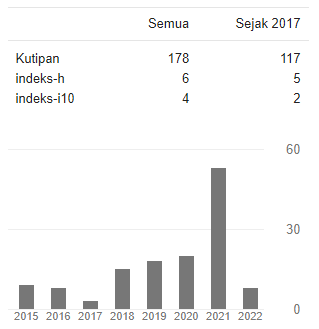Publication Ethics
Jurnal ABM is a peer-reviewed journal. This statement clarifies the ethical behaviour of all parties involved in the act of publishing an article in this journal as well as allegations of research misconduct, including author, chief editor, editorial Board, peer-reviewer and the publisher LPPM STIE Malangkuçeçwara. This statement is based on COPE’s Best Practice Guidelines for Journal Editors.
ETHICAL GUIDELINE FOR JOURNAL PUBLICATION
The publication of an article in Jurnal ABM, as a peer-reviewed journal, is an essential building block in the development of a coherent and respected network of knowledge. It is a direct reflection of the quality of the work of the authors and the institutions that support them. Peer-reviewed articles support and embody the scientific method. It is, therefore, important to agree upon standards of expected ethical behaviour for all parties involved in the act of publishing.
LPPM STIE Malangkuçeçwara as publisher of Jurnal ABM, takes its duties of guardianship over all stages of publishing extremely seriously, thus we recognise our ethical and other responsibilities. We are committed to ensuring that advertising, reprint or other commercial revenue has no impact or influence on editorial decisions. Also, the publishers and Editorial Board will assist in communications with other journals and/or publishers where this is useful and necessary.
ALLEGATIONS OF RESEARCH MISCONDUCT
Research misconduct means fabrication, falsification, citation manipulation, or plagiarism in producing, performing, or reviewing research and writing article by authors, or in reporting research results. When authors are found to have been involved with research misconduct or other serious irregularities involving articles that have been published in scientific journals, Editors have a responsibility to ensure the accuracy and integrity of the scientific record.
In cases of suspected misconduct, the Editors and Editorial Board will use the best practices of COPE to assist them to resolve the complaint and address the misconduct fairly. This will include an investigation of the allegation by the Editors. A submitted manuscript that is found to contain such misconduct will be rejected. In cases where a published paper is found to contain such misconduct, a retraction can be published and will be linked to the original article.
The first step involves determining the validity of the allegation and an assessment of whether the allegation is consistent with the definition of research misconduct. This initial step also involves determining whether the individuals alleging misconduct have relevant conflicts of interest.
If scientific misconduct or the presence of other substantial research irregularities is a possibility, the allegations are shared with the corresponding author, who, on behalf of all of the co-authors, is requested to provide a detailed response. After the response is received and evaluated, additional review and involvement of experts (such as statistical reviewers) may be obtained. For cases in which it is unlikely that misconduct has occurred, clarifications, additional analyses, or both, published as letters to the editor, and often including a correction notice and correction to the published article are sufficient.
Institutions are expected to conduct an appropriate and thorough investigation of allegations of scientific misconduct. Ultimately, authors, journals, and institutions have an important obligation to ensure the accuracy of the scientific record. By responding appropriately to concerns about scientific misconduct, and taking necessary actions based on evaluation of these concerns, such as corrections, retractions with replacement, and retractions, Jurnal ABM will continue to fulfill the responsibilities of ensuring the validity and integrity of the scientific record.
PUBLICATION DECISIONS
The editors of Jurnal ABM are responsible for deciding which of the articles submitted to the journal should be published. The validation of the work in question and its importance to researchers and readers must always drive such decisions. The editors may be guided by the policies of the journal's editorial board and constrained by such legal requirements as shall then be in force regarding libel, copyright infringement and plagiarism. The editors may confer with other editors or reviewers in making this decision.
COMPLAINTS AND APPEALS
Jurnal ABM has a clear procedure for handling complaints against the journal, editorial staff, editorial board or publisher. The complaints will be clarified to respected personal with respect to case of complaint. The scope of complaints include anything related to journal business process, i.e. editorial process, found citation manipulation, unfair editor/reviewer, peer-review manipulation, etc. The complaint cases will be processed according to COPE guideline. The complaint cases should be sent by email to: jabm@stie-mce.ac.id
FAIR PLAY
An editor at any time evaluate manuscripts for their intellectual content without regard to race, gender, sexual orientation, religious belief, ethnic origin, citizenship, or political philosophy of the authors.
CONFIDENTIALITY
The editor and any editorial staff must not disclose any information about a submitted manuscript to anyone other than the corresponding author, reviewers, potential reviewers, other editorial advisers, and the publisher, as appropriate.
DISCLOSURE AND CONFLICTS OF INTEREST
Unpublished materials disclosed in a submitted manuscript must not be used in an editor's own research without the express written consent of the author.
DUTIES OF REVIEWERS
1. Contribution to Editorial Decisions
Peer review assists the editor in making editorial decisions and through the editorial communications with the author may also assist the author in improving the paper.
2. Promptness
Any selected referee who feels unqualified to review the research reported in a manuscript or knows that its prompt review will be impossible should notify the editor and excuse himself from the review process.
3. Confidentiality
Any manuscripts received for review must be treated as confidential documents. They must not be shown to or discussed with others except as authorised by the editor.
4. Standards of Objectivity
Reviews should be conducted objectively. Personal criticism of the author is inappropriate. Referees should express their views clearly with supporting arguments.
5. Acknowledgement of Sources
Reviewers should identify relevant published work that has not been cited by the authors. Any statement that observation, derivation, or argument had been previously reported should be accompanied by the relevant citation. A reviewer should also call to the editor's attention any substantial similarity or overlap between the manuscript under consideration and any other published paper of which they have personal knowledge.
6. Disclosure and Conflict of Interest
Privileged information or ideas obtained through peer review must be kept confidential and not used for personal advantage. Reviewers should not consider manuscripts in which they have conflicts of interest resulting from competitive, collaborative, or other relationships or connections with any of the authors, companies, or institutions connected to the papers.
DUTIES OF AUTHORS
1. Reporting standards
Authors of reports of original research should present an accurate account of the work performed as well as an objective discussion of its significance. Underlying data should be represented accurately in the paper. A paper should contain sufficient detail and references to permit others to replicate the work. Fraudulent or knowingly inaccurate statements constitute unethical behaviour and are unacceptable.
2. Data Access, Retention and Reproducibility
Authors are asked to provide the raw data in connection with a paper for editorial review, and should be prepared to provide public access to such data, if practicable, and should in any event be prepared to retain such data for a reasonable time after publication. Authors are responsible for data reproducibility.
3. Originality and Plagiarism
The authors should ensure that they have written entirely original works, and if the authors have used the work and/or words of others that this has been appropriately cited or quoted.
4. Multiple, Redundant or Concurrent Publication
An author should not, in general, publish manuscripts describing essentially the same research in more than one journal or primary publication. Submitting the same manuscript to more than one journal concurrently constitutes unethical publishing behaviour and is unacceptable.
5. Acknowledgement of Sources
Proper acknowledgement of the work of others must always be given. Authors should cite publications that have been influential in determining the nature of the reported work.
6. Authorship and Contributorship of the Article
Authorship should be limited to those who have made a significant contribution to the conception, design, execution, or interpretation of the reported study. All those who have made significant contributions should be listed as co-authors. Where there are others who have participated in certain substantive aspects of the research project, they should be acknowledged or listed as contributors. The corresponding author should ensure that all appropriate co-authors and no inappropriate co-authors are included on the paper and that all co-authors have seen and approved the final version of the paper and have agreed to its submission for publication.
7. Disclosure and Conflicts of Interest
All authors should disclose in their manuscript any financial or other substantive conflicts of interest that might be construed to influence the results or interpretation of their manuscript. All sources of financial support for the project should be disclosed.
8. Fundamental errors in published work
When an author discovers a significant error or inaccuracy in his/her own published work, it is the author’s obligation to promptly notify the journal editor or publisher and cooperate with the editor to retract or correct the paper.
POLICY STATEMENT ON THE USE OF ARTIFICIAL INTELLIGENCE (AI)
Referring to the statement issued by the Committee on Publication Ethics (COPE), JABM does not endorse the use of Artificial Intelligence (AI) tools, including but not limited to ChatGPT or other Large Language Models (LLMs), as authors of research papers. AI tools cannot meet the criteria for authorship because they are not capable of taking responsibility for the submitted work, declaring conflicts of interest, or managing copyright and licensing agreements.
To uphold the integrity of scholarly publications, every manuscript submitted to JABM will undergo an AI-content detection test using credible and validated software. This procedure aims to ensure that all submitted works adhere to the principles of publication ethics and maintain the originality expected in academic writing.
Authors are fully responsible for the authenticity and ethical integrity of their manuscripts. They are also accountable for any ethical breaches or misconduct arising from their submission.
ETHICAL OVERSIGHT
If the research work involves chemicals, human, animals, procedures or equipment that have any unusual hazards inherent in their use, the author must clearly identify these in the manuscript in order to obey ethical conduct of research using animals and human subjects. If required, Authors must provide legal ethical clearance from association or legal organization.
If the research involves confidential data and of business/marketing practices, authors should clearly justify this matter whether the data or information will be hidden securely or not.
INTELLECTUAL PROPERTY (COPYRIGHT POLICY)
Journal policy about intellectual property or copyright is declared here:
https://journal.stie-mce.ac.id/index.php/jabm/CopyrightNotice
PEER-REVIEW PROCESS POLICY
Peer-Review process/policy is declared here:
https://journal.stie-mce.ac.id/index.php/jabm/Peer_Review_Process
POST-PUBLICATION DISCUSSIONS AND CORRECTIONS
JABM accepts discussion and corrections on published articles by reader. In case the reader giving discussions and corrections toward a published article, the reader can contact by email to Editor in Chief by explaining the discussions and corrections. If accepted (by Editor in Chief), the discussions and correction will be published in next issue as Letter to Editor. Respected Authors can reply/answer the discussions and corrections from the reader by sending the reply to Editor in Chief. Therefore, Editors may publish the answer as Reply to Letter to Editor.

_mini-1.jpg)






1.jpg)









